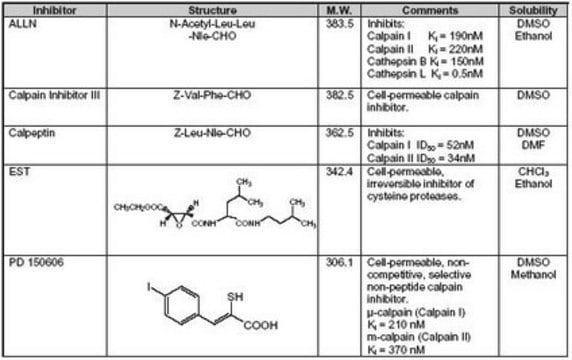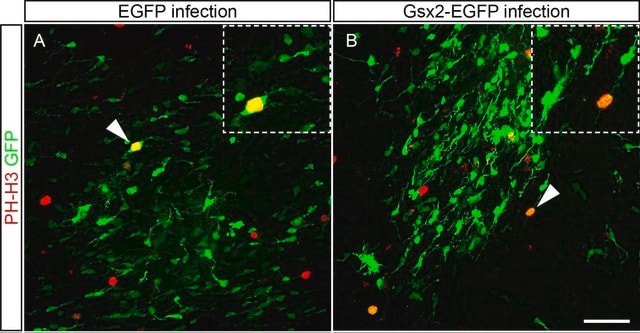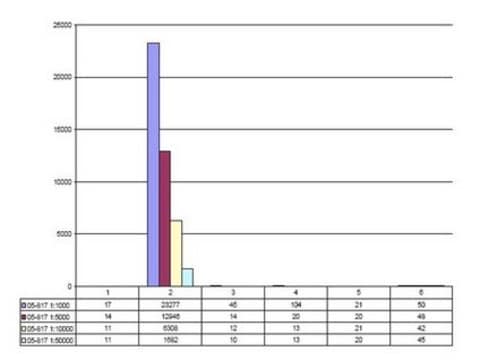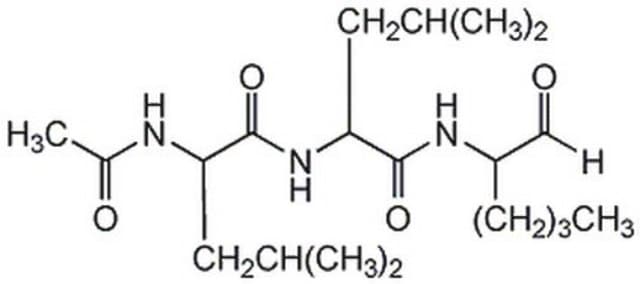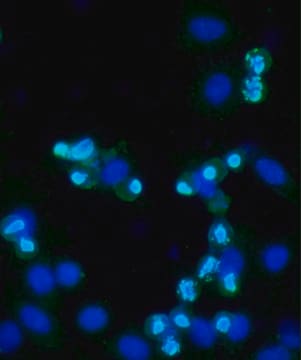208721
ALLM
Cell permeable inhibitor of calpain I (Ki = 120 nM), calpain II (Ki = 230 nM), cathepsin B (Ki = 100 nM), and cathepsin L (Ki = 600 pM).
Synonym(s):
ALLM, Calpain Inhibitor II
About This Item
Recommended Products
Quality Level
Assay
>95% (HPLC)
form
solid
manufacturer/tradename
Calbiochem®
storage condition
OK to freeze
color
off-white
solubility
DMSO: 5 mg/mL
ethanol: 5 mg/mL
methanol: 5 mg/mL
shipped in
ambient
storage temp.
2-8°C
SMILES string
S(CC[C@H](NC(=O)[C@@H](NC(=O)[C@@H](NC(=O)C)CC(C)C)CC(C)C)C=O)C
InChI
1S/C19H35N3O4S/c1-12(2)9-16(20-14(5)24)19(26)22-17(10-13(3)4)18(25)21-15(11-23)7-8-27-6/h11-13,15-17H,7-10H2,1-6H3,(H,20,24)(H,21,25)(H,22,26)/t15-,16-,17-/m0/s1
InChI key
RJWLAIMXRBDUMH-ULQDDVLXSA-N
General description
Biochem/physiol Actions
calpain-1
Warning
Sequence
Reconstitution
Other Notes
Griscavage, J.M., et al. 1995. Biochem. Biophys. Res. Commun.215, 721.
Sarin, A., et al. 1994. J. Immunol.153, 862.
Sarin, A., et al. 1993. J. Exp. Med. 178, 1693.
Banik, N.L., et al. 1992. Neurochem. Res.17, 797.
Koohmaraie, M. 1992. Biochemie74, 239.
Pinter, M., et al. 1992. Biochemistry31, 8201.
Shenoy, A.M., and Brahmi, Z. 1991. Cell. Immunol.138, 24.
Sasaki, T., et al. 1990. J. Enzyme Inhib.3, 195.
Legal Information
Storage Class Code
11 - Combustible Solids
WGK
WGK 1
Flash Point(F)
Not applicable
Flash Point(C)
Not applicable
Certificates of Analysis (COA)
Search for Certificates of Analysis (COA) by entering the products Lot/Batch Number. Lot and Batch Numbers can be found on a product’s label following the words ‘Lot’ or ‘Batch’.
Already Own This Product?
Find documentation for the products that you have recently purchased in the Document Library.
Related Content
Select different protease inhibitor types based on your needs to prevent protein degradation during isolation and characterization and safeguard proteins in sample prep.
Select different protease inhibitor types based on your needs to prevent protein degradation during isolation and characterization and safeguard proteins in sample prep.
Select different protease inhibitor types based on your needs to prevent protein degradation during isolation and characterization and safeguard proteins in sample prep.
Select different protease inhibitor types based on your needs to prevent protein degradation during isolation and characterization and safeguard proteins in sample prep.
Our team of scientists has experience in all areas of research including Life Science, Material Science, Chemical Synthesis, Chromatography, Analytical and many others.
Contact Technical Service
